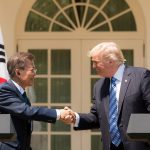House Makes History With Vote to End U.S. Role in Yemen War
(Photo: Felton Davis)
Washington, D.C. — February 13, 2019 — In response to the House of Representatives passing H.J.Res. 37, legislation directing the president to withdraw U.S. support for the Saudi/UAE-led war in Yemen, Paul Kawika Martin, Senior Director for Policy and Political Affairs at Peace Action, released the following statement:
“Building on last year’s Senate vote, the newly empowered House of Representatives just made history by voting to end U.S. support for the war in Yemen, marking the first time the House has successfully invoked the War Powers Act to direct the withdrawal of U.S. forces from an unauthorized war. Representative Ro Khanna’s skillful and determined leadership on this issue has been critical to advancing this legislation and raising awareness of the suffering of Yemenis at the hands of this U.S.-backed intervention. Not only does this vote bolster hopes for a quicker end to the war and the resulting humanitarian crisis, it also signals a timely resurgence in congressional oversight on war. The Senate will have to vote again to send this particular bill to the president’s desk, which it should do without delay, but Congress has now made its opposition to U.S. military involvement in Yemen crystal clear.
“For all his lip service to ending U.S. wars in the State of the Union, the president failed to mention Yemen, but this vote makes it impossible to ignore. Assuming the Senate holds strong in opposition to the war, Trump will soon be faced with a choice to acquiesce to the will of Congress and the American people, or to issue his first veto and draw even more international attention to a conflict he’d rather not talk about. Whatever he decides, congressional action is keeping this story alive, in turn forcing the Saudi-led coalition to get serious about negotiating an end to the war.
“For nations participating in the Saudi-led intervention, this new political reality poses a serious threat to their military relationships with the United States. For millions of Yemenis facing indiscriminate airstrikes and war-induced famine, this new political reality offers a glimmer of hope for a more peaceful future. More work remains to be done, but hope is well worth celebrating.”
###
Background:
The humanitarian situation in Yemen remains dire. According to the U.N. Office for the Coordination of Humanitarian Affairs as of last month, two thirds of Yemen’s population, roughly 20.1 million people, are food insecure, a 13 percent increase from 2018. Nearly 10 million people in Yemen are suffering from extreme hunger, including 2 million children under 5 and over 1 million pregnant and breastfeeding women who require treatment for acute malnutrition.
According to an October 2018 World Peace Foundation report, Saudi Arabia has repeatedly targeted food production and distribution facilities in an apparently deliberate attempt to starve the population of Yemen.
A November 2018 IRC/YouGov poll of Americans found that:
• 75 percent oppose U.S. military support for the Saudi and UAE-led coalition in Yemen.
• 82 percent agree Congress should vote to halt or decrease arms sales to the coalition.
This is not the first time members of Congress have attempted to end U.S. support for the war in Yemen by invoking the War Powers Act. On September 27, 2017, Rep. Ro Khanna (CA-17) introduced H.Con.Res. 81, legislation aimed at ending the unauthorized U.S. role in the war in Yemen. A compromise bill, H.Res. 599, which specifically acknowledged that Congress never authorized U.S. military support for the Saudi-led coalition in Yemen, was negotiated and passed in the House in a vote of 366-30 on November 13, 2017.
On March 20, 2018, the Senate took a procedural vote on similar legislation invoking the War Powers Act in an effort to end the unauthorized U.S. role in the war in Yemen. A motion to table a motion to discharge the legislation, S.J.Res. 54, passed 55-44, preventing the legislation from moving forward. Late last year, Rep. Khanna worked to bring up H.Con.Res. 81 for a vote, but Paul Ryan added a rule to the Farm bill that prevented Khanna’s legislation from coming to a vote. On December 13, 2018, the Senate passed S.J.Res. 54 in a vote of 56-41.
Founded in 1957, Peace Action (formerly SANE/Freeze), the United States’ largest peace and disarmament organization, with over 100,000 paid members and nearly 100 chapters in 36 states, works to abolish nuclear weapons, promote government spending priorities that support human needs, encourage real security through international cooperation and human rights and support nonmilitary solutions to international conflicts. The public may learn more and take action at www.PeaceAction.org.





